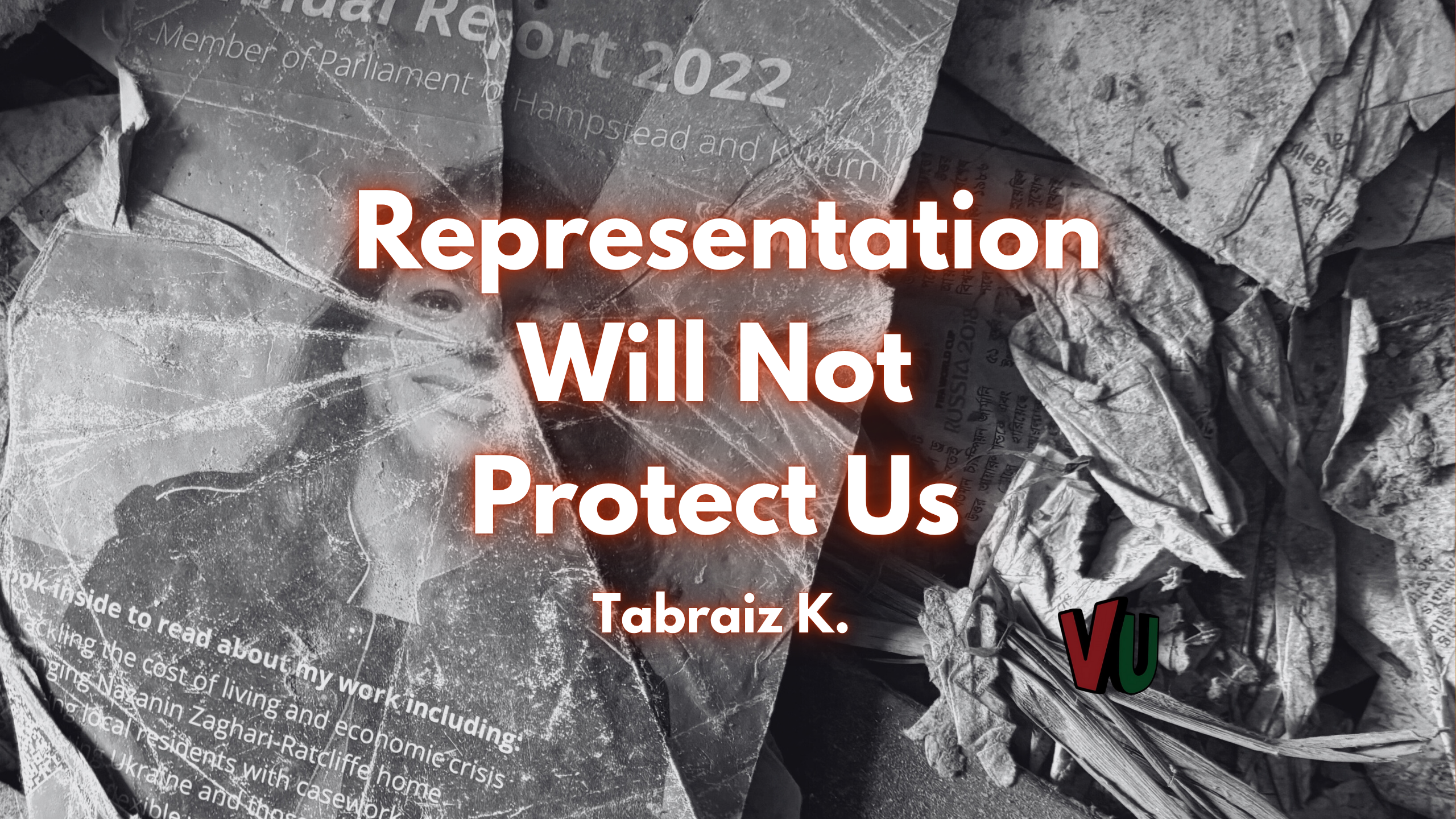
Tabraiz K.
“We were never meant to survive. And when the sun rises we are afraid it might not remain… So it is better to speak, remembering we were never meant to survive.”
– Audre Lorde, “A Litany For Survival”
We were never meant to survive the empire performing for it. And yet here we are clinging to the fleeting pleasure of being recognized by the same structures that have devoured our histories, our dignity, and our dead. On social media, successful Muslim influencers with large platforms remain silent over the genocide of Palestinians and even brandish the logos of companies complicit in Zionism.
In entertainment, Muslim actors play the same tired roles: the conflicted zealot, the secular reformer, or the grieving war-torn child. In the academic sphere, scholars divert to the role of native informant or apolitical intellectual while their universities fund genocide and apartheid. The tropes deemed acceptable are palatable and safely detached from the political realities of our Ummah’s blood. Imperial apologists tell us that representation is a site of power, and simply by acquiring a seat at the table, we have made progress. This seat at the table is, after all, what generations before us could only dream of. But, we have reached a point where we must finally ask: Is our representation protecting us? Who are we asking to see us – and at what cost? And if we have a seat at the table of empire, does that not make us complicit in empire’s criminality?
Representation, when viewed as a tool of empire, masterfully neutralizes radical opposition. It allows the system of domination to absorb its critics, co-opting the language of resistance while defanging its true meaning and call to action. Take, for example, the Muslim politician who panders to the outraged masses yet votes for every surveillance bill and shirks every responsibility to take a material stand against Zionism. Additionally, the academic, who presents a panel on his latest research highlighting the importance of post-colonial and critical frameworks, yet is funded by institutions built on looted bodies. While the millions in Gaza starve and Al-Aqsa remains occupied by a belligerent, terroristic occupier- these are not victories – they are cautionary tales.
We have confused access with authority, presence with power, and visibility with freedom.
In reality, visibility through the eyes of the oppressor offers little to nothing, while giving legitimacy to the oppressor. To build a movement aimed at toppling these systems of oppression, we do not require further attention from a quiet and polite society; we need a pulpit for our enraged masses. Assimilating into the machines of imperialism and oppression can no longer be viewed with the same naive hopes of the past. Instead, we must name our enemy, confront it head-on, and dismantle it brick by bloody brick.
After all, what has representation done for us? It has been powerless against the genocide in Gaza, it did not prevent the forced disappearances in Kashmir, the bulldozers in India, the massacring of the Rohingya, nor the racism against Muslims in France and the world writ large. It did not protect our sisters from being strip-searched in airports or our brothers from being profiled into graves. The occasional Muslim face in the media did nothing for the hungry children of Yemen, nor did the diversity panels stop the bombs over Baghdad.
Mine is not pessimism, it is a refusal to be seduced by Liberal aesthetics while the foundations of our solidarities rot beneath our feet. We must understand that our enemies do not fear our representation; they fear our unified resistance and mental clarity. A formidable people know their Lord and their enemy. We must, therefore, stand resolutely in solidarity with our brothers and sisters across the world who face the deadly weapons of imperialism and colonialism.
As witnesses to the most horrific genocide in history, we must no longer make any excuse in the name of the importance of representation.
Our principles must spring from Gaza, and surely, our representation is not enough. Anas Al-Sharif, martyred on Sunday, August 10, 2025, in Gaza, writes in his last will and testament, “Do not let chains silence you or borders restrain you. Be bridges toward the liberation of the land and its people, until the sun of dignity and freedom rises over our stolen homeland.”
Representation, when it stops at visibility, only helps the oppressor. These forms of tokenism rely on a belief that we must first be liked to be free. However, the Prophet ﷺ was not widely liked; in fact, he was mocked, exiled, threatened, and hunted – not because he lacked eloquence or relatability, but because he spoke the truth in a world that profited from lies. He did not ask for a seat at Quraysh’s table; he broke the table. The Prophet ﷺ did not modify and market Islam according to trends and people’s sensibilities. Instead, he shattered idols and made tawḥīd the uncompromising banner of a new world.
Accurate representation, if it is to mean anything at all, must mean solidarity. Our leaders in visible positions must be unrelenting in their opposition to an evil and corrupt world. They must refuse conformity, dilution, and submission to the imperialist world order. Our principles must centre the dead, the disappeared, the occupied, the bombed, the banned, the buried, and the starved. We must carry their voices in our demands, their wounds in our metaphors, and their names in our hearts.
Visibility without resistance is a corrupt and vain performance – a softer prison that assuages our egos, but abandons our commitments as Muslims.
No, our representation will not protect us. Only Allah will, if we demonstrate genuine sincerity by standing in solidarity with our brothers and sisters, and by speaking truth to power, no matter the cost.
Tabraiz K. is a poet and emerging essayist working across themes of religious identity, cultural erasure, and anti-imperial critique.